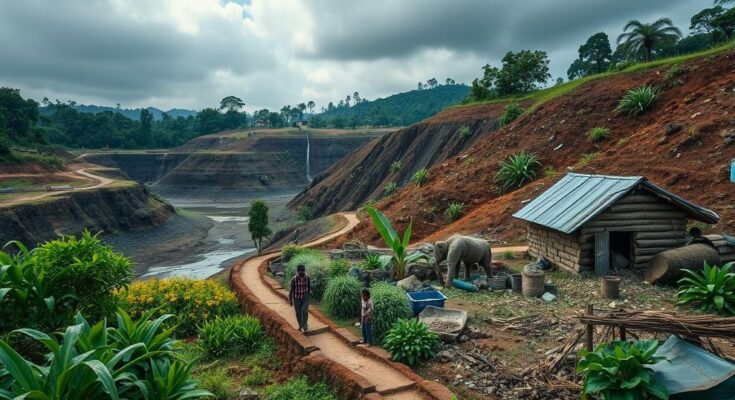The economy of the Democratic Republic of the Congo has evolved from a foreign-dominated mineral extraction system post-independence, to nationalization efforts under Mobutu, leading to extensive corruption and economic decline. Since the early 2000s, reforms have aimed at stabilization and liberalization, while agriculture plays a crucial role in employment and income, albeit hampered by inefficiencies.
The economy of the Democratic Republic of the Congo has undergone significant transformations since its independence in 1960. Initially reliant on mineral extraction, particularly copper and diamonds, the Congolese economy was largely dominated by foreign enterprises, such as the Belgian Union Minière du Haut-Katanga. However, following a coup led by Mobutu in 1965, strategies for nationalization began to reshape the economic landscape. The establishment of Générale des Carrières et des Mines (Gécamines) marked a critical turning point, albeit with problematic governance leading to widespread embezzlement and inefficiency. Mobutu’s regime utilized the income from state enterprises for personal enrichment and to build a substantial patronage network, ultimately undermining economic productivity. The decline of copper prices in the mid-1970s prompted internal and external scrutiny, revealing significant financial mismanagement. Despite international support for Mobutu’s government as a Cold War ally, the economic situation deteriorated throughout the 1990s, culminating in a crisis characterized by negative growth and plummeting per capita income. Post-2000, the DRC initiated reforms to stabilize and liberalize the economy, aided by associations with the IMF and World Bank, resulting in positive GDP growth for the first time in over ten years. Agriculturally, the DRC remains predominantly reliant on subsistence practices. The agricultural sector, alongside forestry and fishing, employs a substantial portion of the workforce while accounting for a significant share of the nation’s GDP. Nevertheless, the potential for commercial agriculture has diminished due to infrastructural decay and market inefficiencies, leading to increased food imports. Export-quality produce, such as coffee, is often smuggled, complicating efforts to revitalize the agricultural economy. While various crops are cultivated regionally, the limited commercial livestock sector necessitates imports to meet domestic meat demands. In summary, the DRC’s economic trajectory illustrates the impacts of political dynamics on national prosperity, underscoring the challenges faced in transitioning from a mineral-dependent economy to a more diversified and stable economic framework.
The Democratic Republic of the Congo, rich in minerals and natural resources, has faced numerous economic upheavals since achieving independence in 1960. Dominated initially by foreign mining companies, the DRC’s government sought nationalization to retain control of its resources, a strategy that unfolded amidst political instability and economic mismanagement. Throughout decades of governance under Mobutu Sese Seko, rampant corruption and the prioritization of personal enrichment over national prosperity weakened the country’s economic foundations. This tumultuous history culminated in a deep economic crisis by the 1990s, characterized by hyperinflation and declining public services. In response to growing domestic unrest and external pressures for reform, the DRC initiated economic restructuring in the early 21st century, now aiming for a sustainable and diversified economy. Agriculture remains vital to the livelihoods of many Congolese, though its challenges, exacerbated by infrastructural limitations, continue to impede full economic recovery.
In conclusion, the economic history of the Democratic Republic of the Congo reflects a complex interplay between mineral wealth, political governance, and social challenges. The transformation from a foreign-controlled mining economy to a state-managed framework under Mobutu, followed by a subsequent need for reform, illustrates the importance of political stability and effective governance in fostering economic resilience. The agricultural sector holds promise but faces significant obstacles that must be addressed to ensure food security and economic growth. Current efforts towards economic reconstruction signify a critical juncture for the DRC to truly leverage its abundant resources for the benefit of its citizens.
Original Source: www.britannica.com




